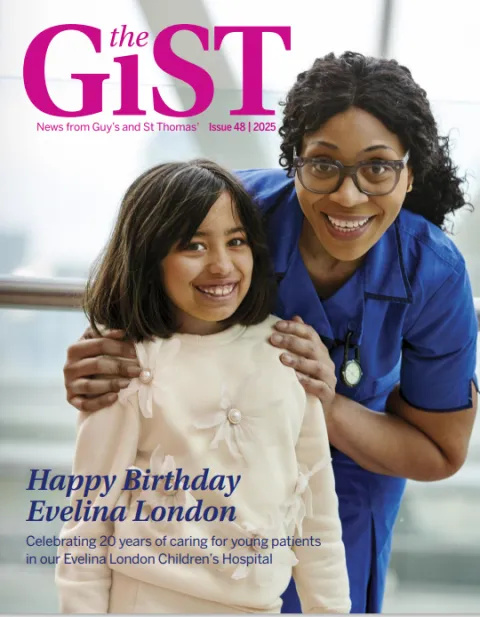The GiST
Publications
- Overview
- Current page section : The GiST
- Annual reports and accounts
- Annual Public Meeting
- Statutory and strategy publications
- How we approve medicines
You can read all our latest news, developments and achievements in our magazine – the GiST.
As local hospitals and the provider of community services in Lambeth and Southwark, we're keen to tell you more about what we do and how you can get involved in our work. There is much to celebrate and be proud of – from our services and exceptional staff to the amazing research and innovation which is allowing us to deliver new and better treatments.
You can download a copy of each issue below.
In this issue, we're celebrating the 20th anniversary of Evelina London Children's Hospital. You can learn about it's history over the last 2 decades. You can also read about our new process for increasing the number of donor organs, how genetic testing is helping families gain early treatment, and the special colony of bees at Harefield hospital.
A text only version of the GiST, issue 48 is also available.
In this issue, you can learn about an exciting clinical trial for adults with severe peanut allergy, an innovative new AI-assisted pregnancy scan, and reflections from Chief Executive, Professor Ian Abbs from his almost 50 years of service.
A text only version of the GiST, issue 47 is also available.
In this issue, you can learn about innovative technologies that are transforming patient care across the Trust. This includes stories about our new specialist drone service, and how a robot at Evelina London is revolutionising complex surgery for our young patients.
A text only version of the GiST, issue 46 is also available.
In this edition of the GiST you can find out about our new values and 5-year strategy, how we have been supporting new research to improve patient care, and about Gloria Sirbu, a 3-year-old who received a life-saving kidney transplant at Evelina London Children’s Hospital.
A text only version of the GiST, issue 45 is also available.
In this edition of the GiST you can find out about Evelina London Children's Hospital's newly launched services to treat rare bladder diseases, how Royal Brompton Hospital's new lung cancer trial, and a pilot project to improve kidney donation rates.
You can also read about Dr Thelma Bates who transformed the way we care for terminally ill patients, how we are supporting local students, and about pioneering robotic treatment.
A text only version of the GiST, issue 44 is also available.
Contact us
Email [email protected] if you have any feedback about the GiST.
